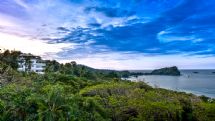Costa Rica FAQ's
Costa Rican Carreta carrying coffee
Q: What is the main city in Costa Rica?
A: The most important city in Costa Rica is San José, the nation's capital. The metropolitan area is home to just over 2.15 million people as well as all the major hubs of activity for the country's government and financial centers.
Other major cities include Liberia, Limón and Puntarenas.
Q: What is the language of Costa Rica?
A: The official national language of Costa Rica is Spanish, but the government also recognizes regional languages such as Mekatelyu (Limonese Creole English) and Bribri (an indigenous tongue belonging to the Chibchan family).
However, English is widely spoken in many tourist areas and hotels, in fact English is taught to Costa Rican's in primary school.
Q: What is the currency of Costa Rica?
A: The currency of Costa Rica is the colón, but the U.S. dollar is frequently accepted by merchants around the country. The colón is named after the Spanish name of Christopher Columbus, who discovered the nation in 1502.
Q: Where can I exchange money?
A: The most convenient place to rate to exchange money for Costa Rican colones is at your hotel. Most hotels also offer this service, although some charge small commissions but in the scheme of things it is not that much. You can exchange in the airport where you pick up your baggage but the rates are typically higher than hotels.
Tourists should not exchange money before leaving the U.S., as American agents will give them significantly worse rates if even available.
We advise to use an ATM when arriving in Costa Rica and to pull out Costa Rica Colones. This is a much easier option of going to a bank. There are ATM's all over the country and there is even an ATM at the baggage terminal in the San Jose International Airport (SJO).
Q: Are there ATM's in Costa Rica?
A: You can find ATM's in all of Costa Rica's major cities and even in some hotels in San Jose. Just using your debit card to get money is better than carrying cash and exchanging it in hotels.
Q: Can I use my credit card in Costa Rica?
A: Yes. American Express, Visa and MasterCard credit cards are accepted throughout the country, but Visa is generally considered to be the most widely used.
Q: Is it safe to swim in the ocean in Costa Rica?
A: Absolutely! Swimming in the ocean is a highlight of many travelers' trips to this beautiful Central American nation. Some beaches have stronger waves that are awesome for surfing however big waves often bring currents and rip tides, so tourists should check with the local hotels in advance before going for a dip.
You should be careful when swimming near an estuary and never intentionally swim in an estuary.
Check out our Tips for staying safe in Costa Rica.
Q: What are the entry and visa requirements for a trip to Costa Rica?
A: To enter the country, you must have a passport that remains valid for at least six months past the end of your trip.
If you are from Argentina, Brazil, Canada, Israel, Japan, Panama, Paraguay, Uruguay, the U.S. or a country in Europe (barring Albania, Bosnia, Bulgaria, the Czech Republic, Iceland, Ireland, Lithuania, Malta, Slovakia and Slovenia), you can stay in Costa Rica for 90 days without a visa.
Travelers from Australia, Belize, China, Guatemala, Honduras, Iceland, Ireland, Mexico, New Zealand, Russia, Singapore, the Philippines and Venezuela can visit the country for 30 days without needing a visa.
Q: Is there an entry or exit tax in Costa Rica?
A: Most airlines are now including this exit tax in the cost of the airline ticket. You can check with your airline ahead of time or you can just go to the airport and your airline will let you know if you need to pay the departure tax or if it was included in your ticket.
Q: What time zone is Costa Rica in?
A: Costa Rica falls in the same time zone as the Central Standard Time region of the U.S., although the country does not observe daylight savings time.
Q: What vaccines should I get before my trip?
A: Illnesses such as malaria and yellow fever have been eradicated in the country, so travelers do not need any special vaccines beyond those for tetanus and influenza.
Q: What are medical facilities like in Costa Rica?
A: Healthcare standards are very high in Costa Rica, particularly in the area around San José or other heavily populated areas.
If you require medical attention during your vacation, you can seek treatment from one of the country's many private hospitals or from the Red Cross.
We strongly suggest that you get a travel insurance policy before taking a trip, it is very affordable. We love World Nomads travel insurance.
Q: What number should I call if I have an emergency during my trip?
A: Like in the United States, the emergency number in Costa Rica is 911 for ambulance, fire and police services.
Q: Is Costa Rican water safe to drink?
A: Generally, yes. You can always get bottled water for your trip, but the water in Costa Rica is said to be safe. In fact, international brewing company Heineken has chosen Costa Rica as the only Central American country where its beer can be made, indicating that the nation's water is of a high quality.
Q: What is the electrical system in Costa Rica?
A: Costa Rica uses the same 110V, 60Hz system as the United States, and it also uses the same kind of wall outlets. Some of the outlets in Costa Rica lack a third hole for a ground prong, however, so travelers may wish to bring a three-prong-to-two-prong adapter.




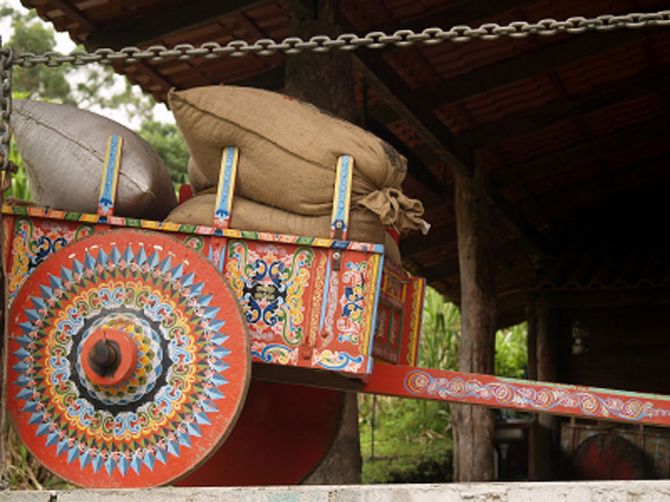
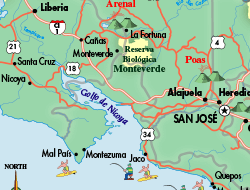
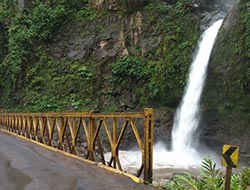
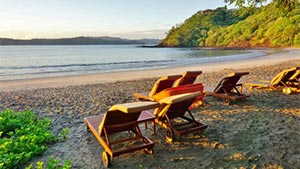
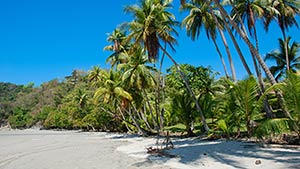
.jpg)
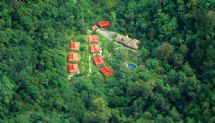
.jpg)


.jpg)

